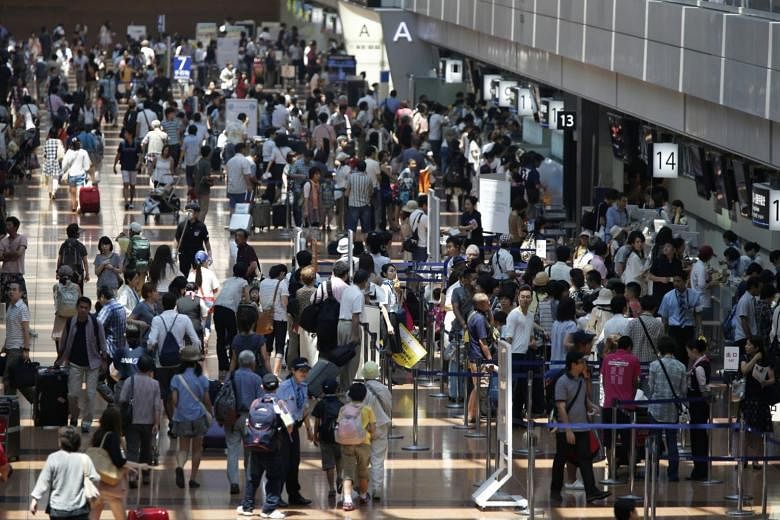TOKYO - The Japan Tourism Agency is mooting a national departure tax of up to 1,000 yen ($12) on both Japanese and foreign travellers as it seeks to capitalise on a tourism boom.
In an interim proposal submitted to the government on Thursday (Nov 9), the agency is recommending that this tax be implemented by March 2020, ahead of the Tokyo Olympic and Paralympic Games to be held in July the same year.
This levy will likely be written as a surcharge on the airfare, such that travellers need not pay an additional duty at the airport. Japan is reportedly studying the approach by states such as Australia and South Korea, whose governments claw back the "departure tax" from the airlines.
The new duty - which some have coined the "sayonara tax" - will be used to boost tourism infrastructure nationwide, promote off-the-beaten-track destinations in rural Japan, and launch global tourism campaigns.
Among the enhancements in store are more multilingual support and Wi-Fi hotspots for travellers, faster immigrations and customs clearance, and security improvements.
This new national tax comes on top of the airport "passenger service" charge that Japan's major airports already impose, and is included in the airfare. This fee - common to major airports around the world including Singapore's Changi Airport - is typically used for the maintenance and security of an airport's common areas, among other things.
A fee of 1,540 yen to 2,610 yen is charged for those departing from Narita Airport, a fee of 1,280 yen to 2,570 yen is charged for those leaving from Haneda Airport, while those departing from Kansai Airport in Osaka pay an extra 560 yen to 3,040 yen.
The proposal by the Japan Tourism Agency comes as tourism arrivals have surged, with records being smashed year after year. As of Nov 4, the number of foreign visitors to Japan this year has already surpassed the record high of 24.04 million visitors set last year.
"We'd like to accelerate steps to cultivate new tourism resources," said Mr Keiichi Ishii, who is Minister of Land, Infrastructure, Transport and Tourism, on Friday (Nov 10).
Japan aims to draw 40 million overseas visitors annually by 2020, when Tokyo hosts the marquee Olympic sporting event, and 60 million by 2030.
Last year, a total of 40 million travellers - including some 16 million Japanese - departed the country, which could have added about 40 billion yen into government coffers had the "departure tax" system been in place.
Japan is studying the examples of Australia, which imposes a fee of A$60 (S$63) on all departing travellers, and South Korea, where passengers fork out 10,000 won (S$12.15) when they leave.
A similar system is also in place in Hong Kong, which charges departing travellers an extra HK$120 (S$20.90). The United Kingdom, meanwhile, charges an air passenger duty of 78 pounds (S$140) for an economy seat on a long-haul flight.
Kyodo News reported that this would be the first new permanent national tax that has been imposed by the Finance Ministry since 1992, when it rolled out the land value tax.
Separately, the city of Kyoto, whose infrastructure is coming under strain due to an influx of tourists, has proposed a lodging tax of at least 200 yen a night.
This will apply to all forms of accommodation including hotels, traditional ryokan inns and Airbnb home lodging, and could start from October 2018.
The tax, of between 200 yen and 1,000 yen per night, will be pegged to the room type and rates.
The additional revenue will reportedly be used by the city government to promote tourism and improve infrastructure in the city.


